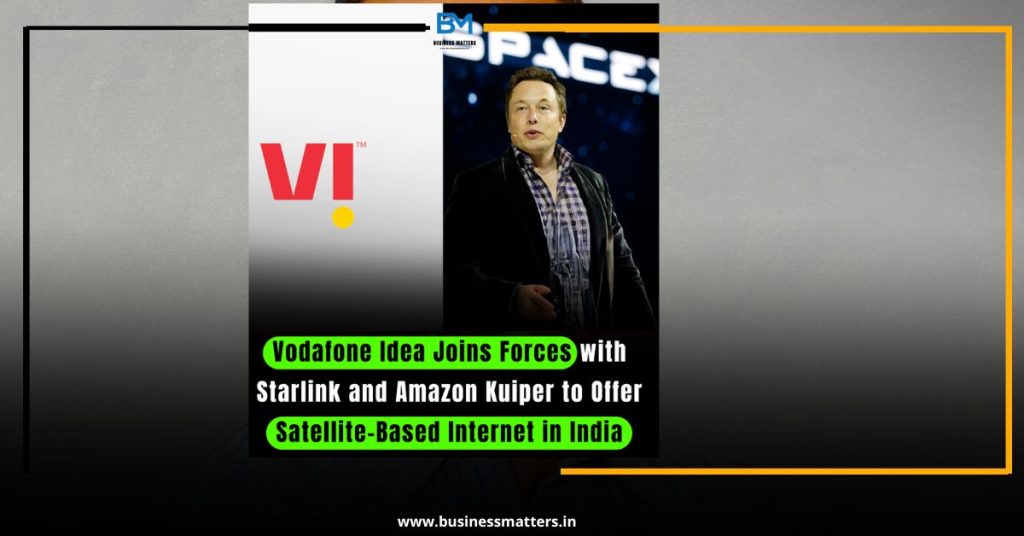Vodafone Idea, one of India’s leading telecom providers, has begun discussions with Starlink (led by Elon Musk) and Amazon’s Kuiper (owned by Jeff Bezos) to provide satellite-based internet services to its customers in India. This strategic move aligns Vodafone Idea with its major competitors, Bharti Airtel and Jio Infocomm, who have already made significant steps in bringing satellite-based internet connectivity to the Indian market.
Vodafone Idea’s Strategic Collaboration
In recent developments, Vodafone Idea’s Chief Technology Officer (CTO), Jagbir Singh, revealed that the company is in talks with both Starlink and Amazon Kuiper to explore how these satellite internet services could be integrated into its existing offerings. While the company has refrained from providing specific details, Singh assured stakeholders that Vodafone Idea would provide updates “at an appropriate time.”
This collaboration comes at a time when the Indian telecom sector is experiencing significant shifts, with companies striving to expand their services and tap into underserved areas of the country, especially rural regions, where traditional internet connectivity has been a challenge. Satellite internet has emerged as a promising solution to address these connectivity gaps and offer high-speed internet services across remote locations.
Read Also :- Pixxel’s Groundbreaking Satellite Imagery Paves the Way for a New Era in Earth Observation
Bharti Airtel and Jio Infocomm’s Satellite Internet Deals
Vodafone Idea‘s discussions with Starlink and Amazon Kuiper come shortly after Bharti Airtel and Jio Platforms, two of the biggest players in the Indian telecom industry, entered into agreements with SpaceX. These agreements aim to bring Starlink’s satellite internet services to India, providing fast, reliable internet services even in remote and rural regions.
However, it is important to note that these partnerships are still contingent on SpaceX securing the necessary regulatory approvals to offer its Starlink satellite services in India. The Department of Telecommunications (DoT) in India must approve the licensing requirements for satellite internet services, which currently remains a point of discussion and negotiation.
Satellite Internet Services: A Game-Changer for India’s Telecom Sector
India, with its vast geography and a large rural population, has long faced challenges in providing consistent and high-quality internet connectivity in remote areas. While traditional broadband infrastructure has been effective in urban and suburban areas, rural regions continue to suffer from limited access to high-speed internet.
Satellite-based internet offers a potential solution to these problems by providing reliable internet coverage in even the most isolated areas. This is why telecom giants like Vodafone Idea, Bharti Airtel, and Jio Infocomm are keen to partner with space-based internet providers like Starlink and Amazon Kuiper.
Both Starlink and Amazon Kuiper have ambitious plans to create large constellations of low Earth orbit (LEO) satellites to provide global internet coverage. Starlink, operated by SpaceX, already has a significant number of satellites in orbit and has started providing services in various countries. Amazon Kuiper, on the other hand, is in the process of launching its satellites and aims to offer similar services worldwide in the near future.
For Vodafone Idea, entering this space is crucial for staying competitive in a market dominated by players like Jio and Airtel. Offering satellite-based internet services would not only expand its customer base but also help the company meet the growing demand for faster and more reliable internet access.
The Role of Regulatory Approvals
While the partnerships between telecom operators and satellite internet providers hold great promise, they are subject to regulatory hurdles. The Indian government’s Department of Telecommunications (DoT) will need to review and approve these satellite internet services, ensuring they comply with the country’s communication laws and regulations.
The process of obtaining regulatory approval for satellite internet services is not instantaneous, and companies like SpaceX, Starlink, and Amazon Kuiper will need to work closely with Indian authorities to secure the necessary permissions. As of now, no satellite internet service provider has been granted full regulatory clearance to operate in India, though discussions are ongoing.
What’s Next for Vodafone Idea and the Indian Telecom Market?
Vodafone Idea’s decision to engage with satellite internet services shows its commitment to adapting to changing market dynamics and leveraging new technologies to benefit its customers. With the potential regulatory approval of satellite internet services, Vodafone Idea, along with its rivals, will likely offer competitive pricing plans and service bundles to attract new users, especially in rural and underserved areas.
As the Indian telecom market continues to evolve, the introduction of satellite internet services could be a game-changer for millions of people in remote locations, providing them with faster and more reliable internet access.
Conclusion
Vodafone Idea’s partnership discussions with Starlink and Amazon Kuiper signal an exciting new chapter in India’s telecom industry. If successful, these ventures will bring high-speed satellite internet to remote areas across the country, overcoming the limitations of traditional broadband services. With competitors like Bharti Airtel and Jio Infocomm already making moves in this direction, the Indian telecom market is set for an innovative and transformative phase.
As regulatory approvals are awaited, consumers can expect a new era of connectivity where high-speed internet will be accessible to all corners of India, regardless of location. For Vodafone Idea, staying ahead of the curve in offering satellite internet services could be the key to maintaining its competitive edge in the rapidly evolving telecom industry.


